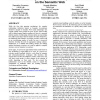Free Online Productivity Tools
i2Speak
i2Symbol
i2OCR
iTex2Img
iWeb2Print
iWeb2Shot
i2Type
iPdf2Split
iPdf2Merge
i2Bopomofo
i2Arabic
i2Style
i2Image
i2PDF
iLatex2Rtf
Sci2ools
135
click to vote
WWW
2005
ACM
2005
ACM
SemRank: ranking complex relationship search results on the semantic web
While the idea that querying mechanisms for complex relationships (otherwise known as Semantic Associations) should be integral to Semantic Web search technologies has recently gained some ground, the issue of how search results will be ranked remains largely unaddressed. Since it is expected that the number of relationships between entities in a knowledge base will be much larger than the number of entities themselves, the likelihood that Semantic Association searches would result in an overwhelming number of results for users is increased, therefore elevating the need for appropriate ranking schemes. Furthermore, it is unlikely that ranking schemes for ranking entities (documents, resources, etc.) may be applied to complex structures such as Semantic Associations. In this paper, we present an approach that ranks results based on how predictable a result might be for users. It is based on a relevance model SemRank, which is a rich blend of semantic and information-theoretic technique...
Internet Technology | Semantic Associations | Semantic Relationship Search | Semantic Web Search | WWW 2005 |
Related Content
| Added | 22 Nov 2009 |
| Updated | 22 Nov 2009 |
| Type | Conference |
| Year | 2005 |
| Where | WWW |
| Authors | Kemafor Anyanwu, Angela Maduko, Amit P. Sheth |
Comments (0)

